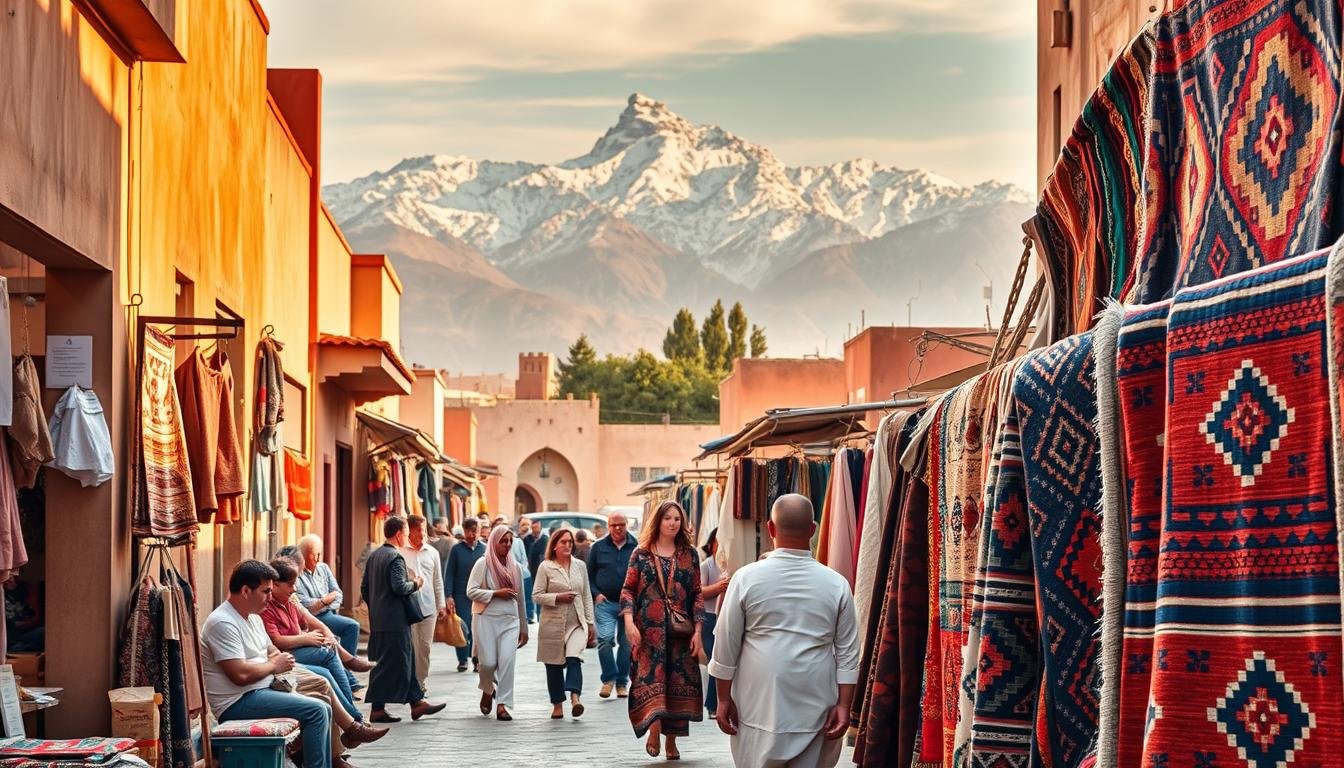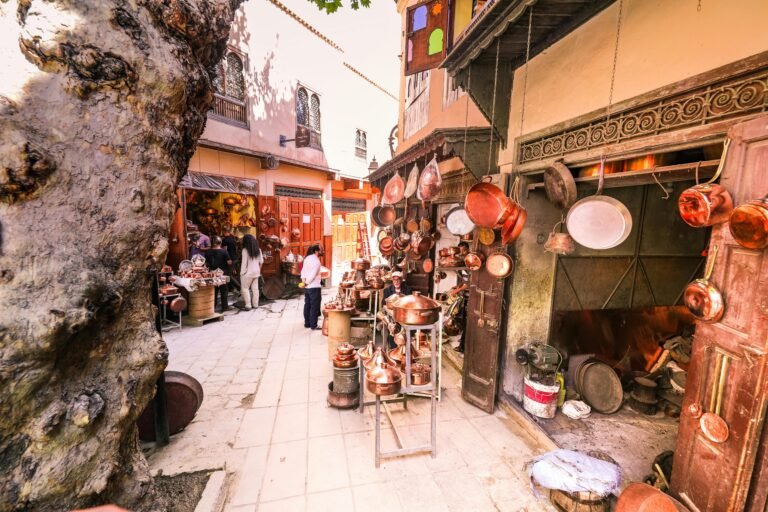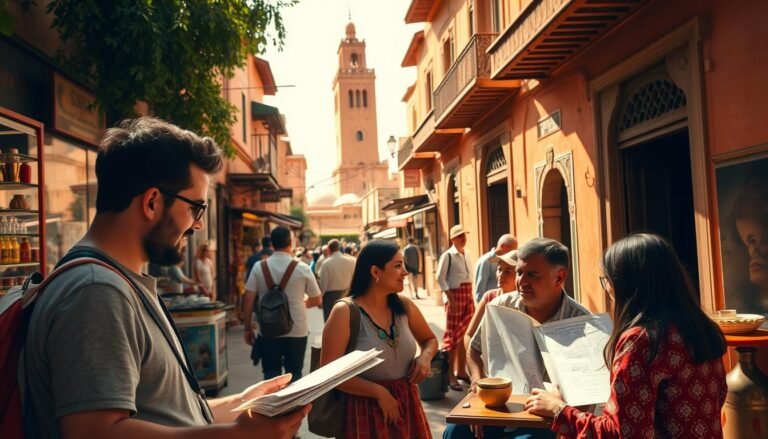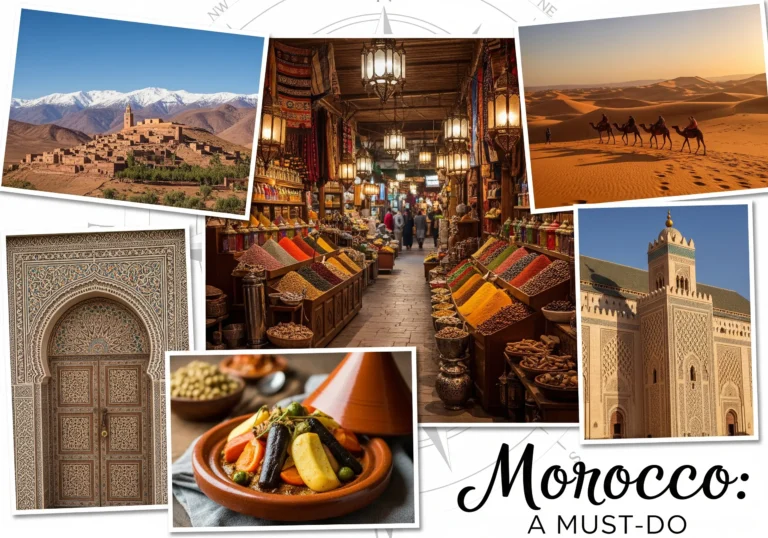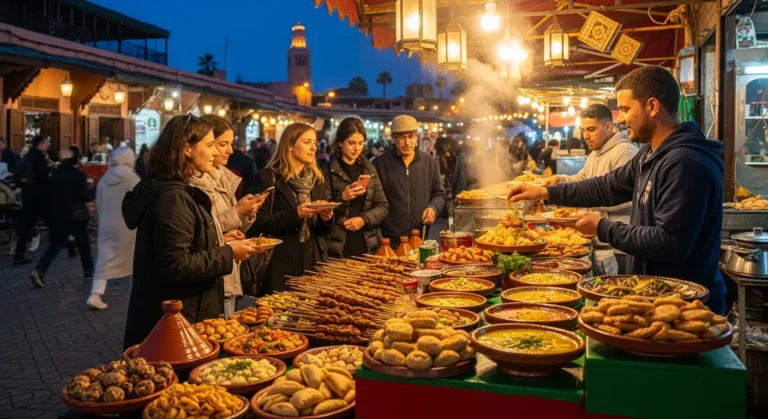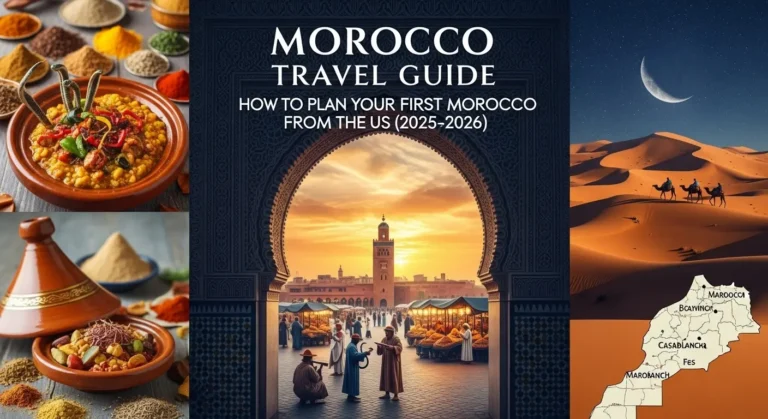Best Time to Visit Morocco.
The Best Time to visit Morocco varies with the country’s diverse weather, from the scorching Sahara Desert to the mild Mediterranean coast. Planning your trip around the seasons ensures the best experience. Morocco’s climate shifts from hot and dry in the desert to mild and wet in the north, so packing right is essential. Whether you dream of exploring vibrant cities or relaxing on sunny beaches, choosing the right time to go makes all the difference.
Table of Contents
Understanding Morocco’s Diverse Climate
Planning your trip to Morocco? It’s important to know the climate. The weather varies greatly across the country. This is due to its geography, with mountains, deserts, and coastlines.
Regional Climate Variations Across the Country
Morocco’s climate shifts from north to south and east to west. The north has a Mediterranean climate, while the south is desert-like. The Atlas Mountains block rain, making the climate different everywhere.
Four Distinct Seasons in Morocco
Morocco has four clear seasons, but they vary by area. Spring and autumn are nice and mild. Winters can be chilly, mainly in the mountains. Summers are very hot, mostly in the desert.
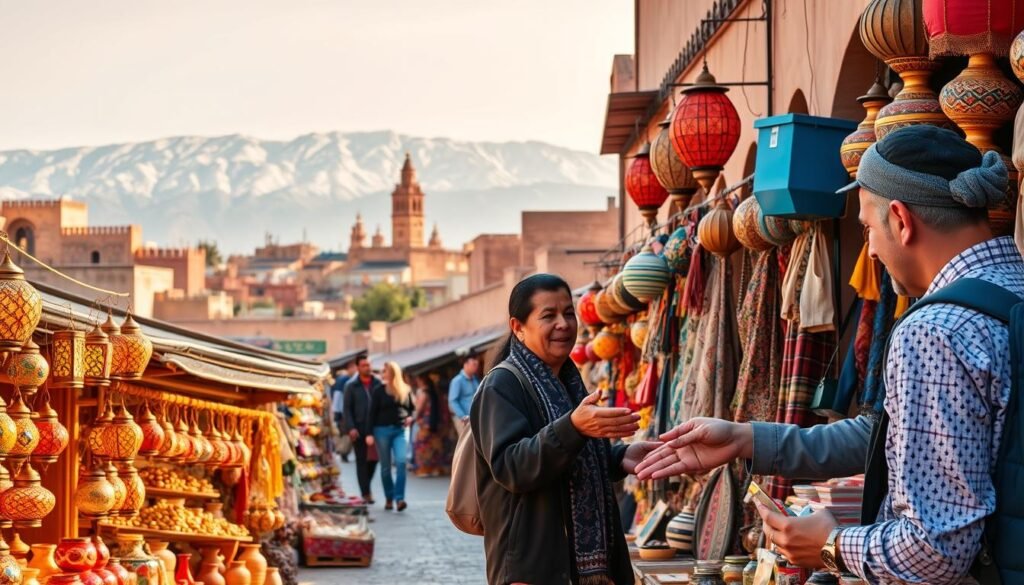
The Best Time to Visit Morocco: Season-by-Season Breakdown
Morocco is a great place to visit all year round. The best time for you depends on what you want to do and see. Each season has its special things to offer.
Spring (March-May): The Ideal Balance
Spring is the ideal time to travel to Morocco. The weather is nice and not too hot. It’s great for seeing cities, mountains, and deserts.
You can enjoy festivals and see beautiful landscapes. It’s perfect for taking photos and doing outdoor activities.
Autumn (September-November): Perfect Weather Returns
Autumn brings back nice weather, like spring. It’s not too hot and there are fewer people around. It’s a good time for hiking in the Atlas Mountains or visiting the Sahara Desert.
The peak season in Morocco is ending. This means you can enjoy things more calmly.
Winter (December-February): Mild Coastal Areas and Snowy Mountains
Winter in Morocco is different in different places. Coastal areas are mild, while mountains can be cold. The High Atlas mountains get snow, which is great for skiing and snowboarding.
Cities like Marrakech have mild winters. They’re perfect for seeing cultural sites without too many people around.
Summer (June-August): Heat and Crowds
Summer is the peak tourist season in Morocco. It’s warm and sunny, but it can be very hot in the desert and inland. Coastal towns like Essaouira are cooler.
If you want a beach vacation or to see Marrakech’s lively scene, summer is for you.
Every season in Morocco is special. Knowing what each season is like helps you plan your trip better.
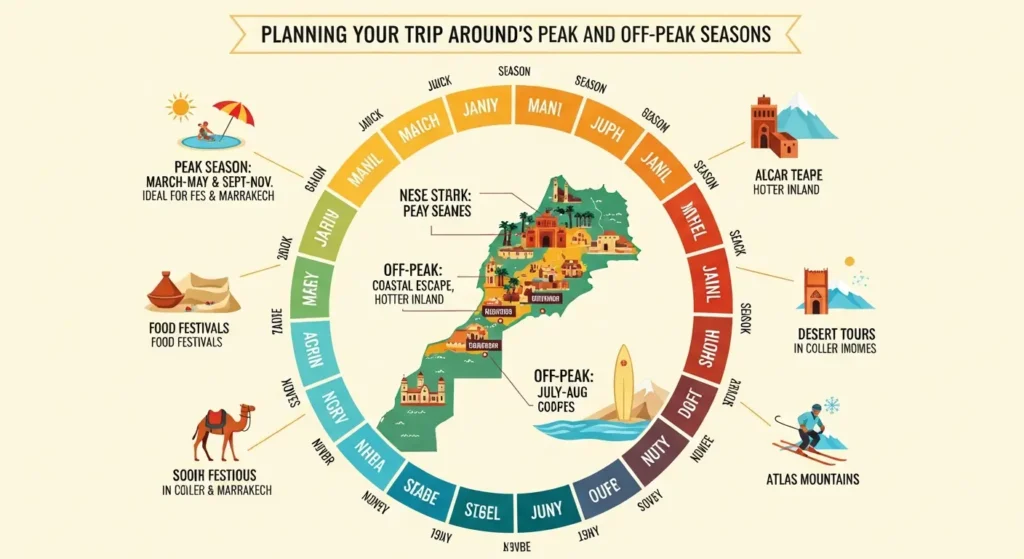
Planning Your Trip Around Morocco’s Peak and Off-Peak Seasons
Knowing when to visit Morocco can make your trip better. The country has a varied climate and rich culture. The experience changes with the season you choose.
Peak Season Considerations
April-May and September-October are Morocco’s peak seasons. The weather is nice, perfect for seeing cities, mountains, and deserts. But places get busy, and things cost more.
Benefits of Off-Peak Travel for UK Visitors
Traveling off-peak has perks for UK visitors. Prices for staying and tours drop, saving you money. You’ll also see fewer people, giving you a true taste of Morocco.
Price Variations Throughout the Year
Prices in Morocco change a lot, due to demand and events. Here’s what you can expect:
Regional Guide: When to Visit Morocco’s Top Destinations
Morocco’s different regions offer unique experiences. But knowing when to visit is key to a great trip. The country’s varied climate means each area is best at different times.
Marrakech and Central Morocco
Marrakech is lively all year, but spring (March to May) or autumn (September to November) are the best times. These seasons have nice weather for exploring the souks and historic sites. Summer is very hot, and winters are mild but can get cool at night.
Coastal Cities: Casablanca, Rabat, and Essaouira
Morocco’s coastal cities have a milder climate than inland areas. Casablanca and Rabat are great in spring and autumn for sightseeing. Essaouira is best in summer for beach activities, but it can be windy. Winters are mild, making these cities good to visit any time.
The Sahara Desert Experience: Timing Your Desert Adventure
The Sahara Desert is best from October to March for cooler weather. This makes camel treks and desert camping more comfortable. Summer is too hot for desert adventures. The cooler months also offer clearer skies for stargazing.
Atlas Mountains and Mountain Towns
The Atlas Mountains have a different climate from the desert and the coast. Winter is best for snow sports in the high elevations. Spring and autumn are ideal for hiking and trekking, with nice weather and beautiful views.
Cultural Festivals and Events: Timing Your Visit
Morocco’s diverse culture is shown in its many festivals and events all year round. Visiting during these times can make your trip better.
Religious Festivals and Ramadan: What UK Travelers Should Know
Morocco is a Muslim country, and religious festivals are big. Ramadan is a month of fasting for Muslims. Travelers don’t have to fast, but it’s good to respect local customs during Ramadan. Understanding and respecting these traditions can enrich your travel experience.
Music and Arts Festivals Worth Planning Around
Morocco’s music and arts scene is lively. Festivals like the Marrakech International Film Festival and the Fez Festival of World Sacred Music are special. These events showcase the country’s rich artistic heritage and provide opportunities to engage with local artists and performers.
Local Moussems and Celebrations
Local moussems, or festivals, are key to Moroccan culture. They celebrate a town’s patron saint with music, dance, and food. Visiting during a moussem can give you a deeper insight into local traditions and community life.
Seasonal Food and Harvest Festivals
Morocco’s food scene is celebrated in many festivals. These events focus on the country’s seasonal produce and traditional dishes. Participating in a food festival can be a delicious way to experience Moroccan culture.
Practical Travel Tips for UK Travelers to Morocco
Planning your trip to Morocco? It’s key to think about the practical stuff that makes your trip better. Knowing how to travel from the UK to Morocco can improve your experience.
Visa Requirements and Entry Procedures for British Citizens
As a British citizen, you don’t need a visa for tourism or business for up to 90 days in Morocco. But your passport must be valid for at least six months after your stay. Make sure you have a return or onward ticket, as officials might ask to see it.
Currency Exchange and Budget Considerations
The Moroccan Dirham (MAD) is the local currency. You can exchange it at the airport or withdraw cash from ATMs. Credit cards are also widely accepted in tourist areas. Morocco offers many options for different budgets, making it easy to plan your expenses.
Here’s a simple budget breakdown:
- Accommodation: £20-£100 per night
- Food: £5-£15 per meal
- Transportation: £5-£20 per ride
Health and Safety Tips by Season
Morocco’s weather changes a lot with the seasons. In summer, drink lots of water and protect yourself from the sun. In winter, wear warm clothes for cooler evenings, even in the mountains.
Travel Insurance Recommendations
It’s wise to have travel insurance that covers medical costs, trip cancellations, and lost or stolen items. Choose policies that also cover activities you plan to do, like desert treks or mountain hikes.
By following these practical tips, your trip to Morocco will be more enjoyable and stress-free. Whether you’re exploring Marrakech’s busy streets or relaxing in Essaouira, being prepared is key.
What to Pack for Morocco: Seasonal Packing Guide
To enjoy Morocco fully, knowing what to pack for each season is key. Morocco’s weather changes a lot from north to south and with the seasons. So, it’s important to pack right.
Spring and Autumn Essentials
Spring (March to May) and autumn (September to November) are great times to visit Morocco. The weather is mild. Here’s what to bring:
- Lightweight clothes for warm days
- Layers for cooler evenings
- Comfortable shoes for walking
- Sun protection (sunscreen, hat, sunglasses)
Summer Must-Haves for Beating the Heat
Summer (June to August) is hot, even in the desert. To stay cool, pack:
- Loose, light clothes
- A scarf or bandana for your neck
- Sunglasses and a hat
- Refillable water bottle to stay hydrated
Winter Packing List for Varied Climates
Winter (December to February) is generally cooler, especially in the mountains. Bring:
- Warm clothes for chilly mornings and evenings
- Waterproof jacket or umbrella
- Thermal layers for cold mountain areas
- Warm socks
Creating Your Perfect Itinerary Based on When You Visit
Whether you love Morocco’s cities, deserts, or mountains, when you go is key. The weather changes a lot, so the best time to visit depends on what you like to do. You can choose from bustling cities, peaceful deserts, or stunning mountains.
One-Week Seasonal Itineraries from the UK
A week in Morocco is great for seeing the highlights. In spring, Marrakech and the Atlas Mountains are perfect. Summer is best for Essaouira’s coast. Autumn is great for Merzouga’s desert. Winter is mild in coastal towns or snowy in the Atlas Mountains.
| Season | Recommended Activities | Best Places to Visit |
|---|---|---|
| Spring | Hiking, exploring medinas | Marrakech, Atlas Mountains |
| Summer | Beach activities, water sports | Essaouira, Taghazout |
| Autumn | Desert adventures, cultural tours | Merzouga, Fez |
| Winter | Skiing, exploring coastal towns | Casablanca, Rabat, Atlas Mountains |
Two-Week Exploration Options Throughout the Year
In two weeks, you can see more of Morocco. Mix city life with desert adventures or relax on the coast. Spring and autumn are the best times for a two-week trip, depending on what you like.
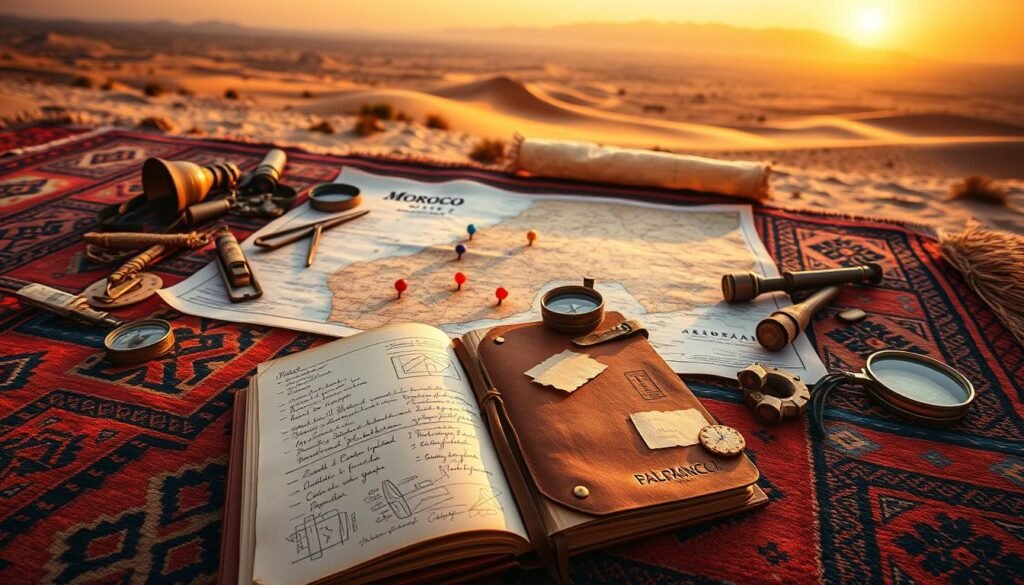
Adjusting Activities Based on Weather Conditions
The weather in Morocco changes a lot. So, plan your activities wisely. Summer is great for water sports, while cooler months are better for hiking and Medina tours.
Combining Regions for Optimal Weather Experiences
Morocco’s climate lets you mix regions for the best weather. For example, desert visits in autumn or winter avoid the heat. Summer is perfect for the coast.
Day Trip Recommendations by Season
- Spring: Day trips to the Ourika Valley or exploring the souks in Marrakech.
- Summer: Visiting the coastal town of Taghazout or enjoying water sports in Essaouira.
- Autumn: Exploring the Sahara Desert or visiting the ancient city of Fez.
- Winter: Skiing in the Atlas Mountains or relaxing in the coastal city of Casablanca.
Conclusion: Making the Most of Your Moroccan Adventure
Now that you know about Morocco’s climate, you’re set to plan your trip. Whether you want to visit during the busy season or the quiet times, knowing the environment is essential. It helps make your journey a success.
Choosing the right time lets you fully enjoy Morocco’s culture, landscapes, and history. Spring and autumn are ideal times to visit Marrakech, the Atlas Mountains, and the Sahara. Winter is perfect for the mild coasts and snowy mountains.
Traveling off-peak can save you money and avoid crowds. You can also catch Morocco’s cultural festivals like the Marrakech International Film Festival or the Essaouira Gnawa Music Festival.
With this guide, you’re ready to decide when to visit Morocco and enjoy it to the fullest. So, pack your bags and get ready for an amazing Moroccan adventure.

